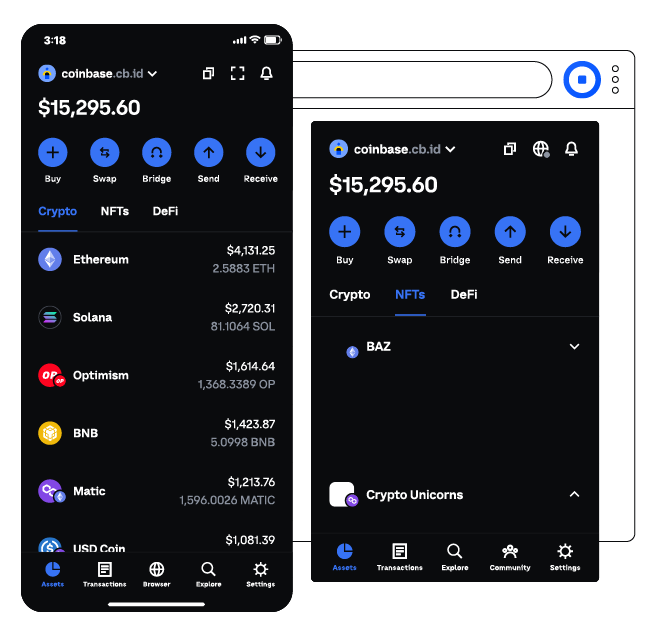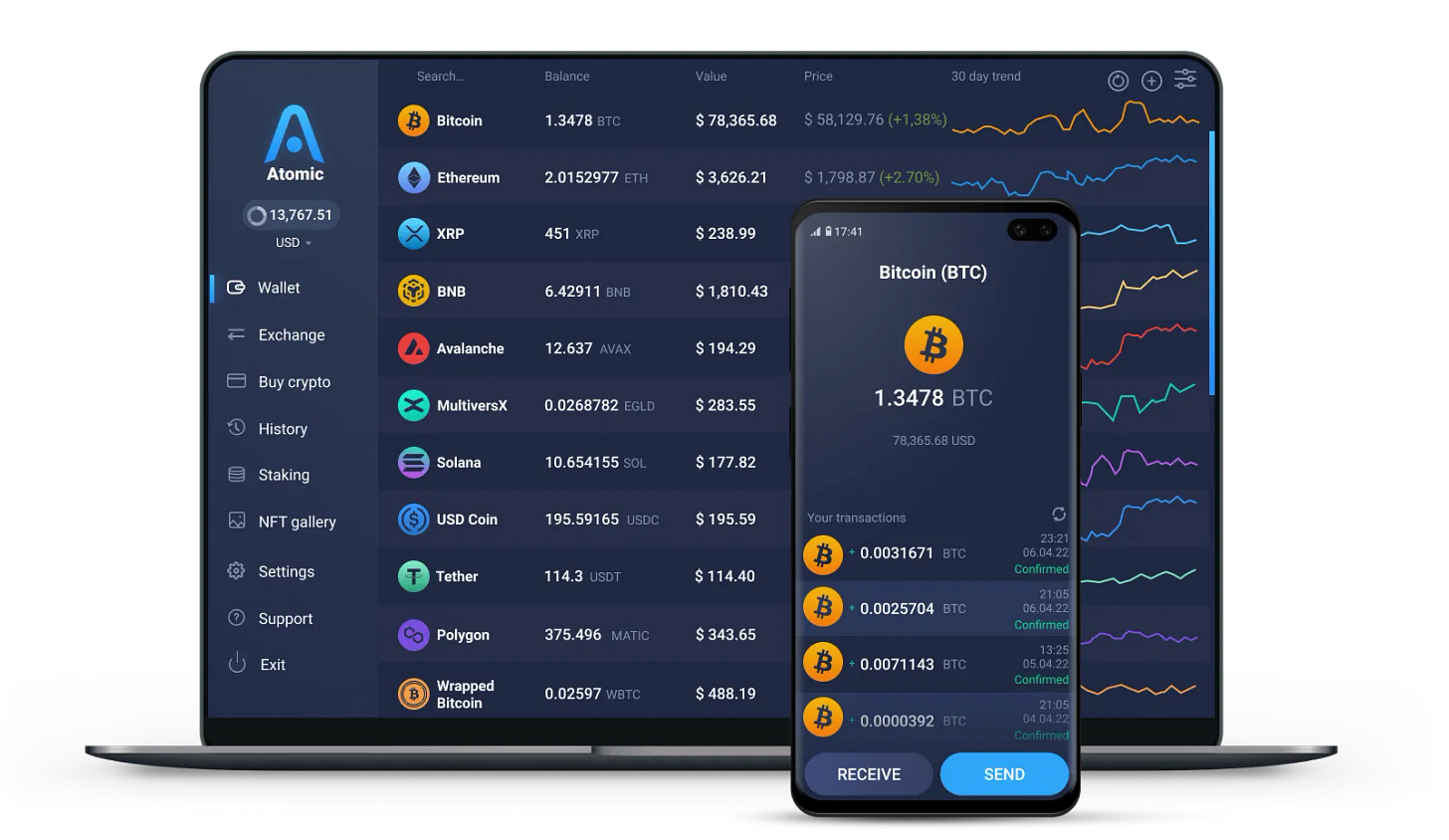As cryptocurrencies continue gaining popularity, more people are looking for ways to safely and securely store their digital assets. That's where crypto wallets come in.
Whether buying, exchanging, or selling crypto, you'll need a wallet to safeguard your holdings and validate transaction information. In this article, we'll explore the best crypto wallets of 2023 and see how to choose the right one for your needs.
What are Crypto Wallets, and Why Are They Important?
Before we dive into the best crypto wallets of 2023, let's take a look at the basics.
Crypto wallets are essentially software programs that store keys, which are used to validate transactions and keep cryptocurrencies safe. However, crypto wallets don't actually store your cryptocurrencies. Instead, your holdings are stored on the blockchain, and your private keys allow you to access and manage them.
So why are crypto wallets crucial?
Crypto wallets enable you to securely send and receive cryptocurrencies, and they provide proof of ownership for your digital assets. If you lose your private keys, you won't be able to access your crypto. As a result, it's essential to use a reliable wallet service or keep your hardware wallet secure.
Types of Crypto Wallets
There are several types of crypto wallets available, each with its own pros and cons. Let's take a closer look at each type:
Paper Wallets
Paper wallets are essentially printed pieces of paper that contain your private and public keys.
Because they're stored offline, paper wallets are highly secure and almost impossible for hackers to access.
However, they're not very convenient to use, as you'll need to enter your keys manually every time you want to access your crypto assets. Paper wallets are also referred to as cold wallets.
Hardware Wallets
These are physical devices, like USB drives, that store your private and public keys. They're highly secure and can be disconnected from the internet when not in use, making them almost impossible for hackers to access.
However, they're not as convenient as online wallets, as you'll need to physically connect the device to a computer every time you want to access your cryptocurrencies.
Online Wallets
Online wallets are software programs that store your private and public keys on a server. They're highly convenient, as you can access your crypto with an internet connection. But, they're not as secure as hardware wallets, as they're more vulnerable to hacking attempts.
It is important to remember that there are tradeoffs with each type. Paper and hardware wallets have limited accessibility and a chance of being lost or destroyed.
As a result, they are less accessible to malicious users because they are held offline.
The easiest method to start using cryptocurrency is via an online wallet provided by a big exchange like Binance or Coinbase, which balances security and accessibility.
Because your private information is online, the security of your wallet provider determines how well you are protected against hackers; be sure to seek measures like two-factor authentication and a history of hacks.
How to Choose the Best Crypto Wallet
Now that you understand the different types of crypto wallets, how do you choose the best one for your needs? Here are some factors to consider:
Type of Wallet: The first factor to consider is the type of wallet that you prefer. Do you want the high level of security provided by hardware wallets, or do you value convenience and accessibility more?
Ease of Use: For newcomers to the world of cryptocurrencies, sending, receiving, and storing digital assets can be challenging and confusing. Look for a wallet that's easy to set up and use, and that's compatible with your level of technical expertise.
Security Features: Look for a wallet that offers robust security features like multi-signature support and two-factor authentication. Check to see if the wallet has ever been hacked or breached in the past.
Supported Digital Currency: Are you searching for a wallet that can just hold one cryptocurrency, such as Bitcoin, or are you looking for a multi-currency wallet? Remember that some coins and tokens can only be held in an official wallet, so make sure the wallet you choose is compatible with the cryptocurrencies you need to store.
Additional Features: Some wallets offer additional features like in-wallet exchanges or access to real-time fiat exchange rates. Consider what features are important to you and look for a wallet that offers those features.
Cost: While the majority of cryptocurrency wallets are free to use, choosing a hardware wallet requires you to be prepared to pay a fee. When making a choice, take into account the upfront cost and other expenses. Check the small print because some wallets impose a fee for each transaction you make.
Reputation: How much trust does the wallet enjoy from the public? For information on how other users feel about the wallet and if they would suggest it, read a variety of unbiased internet reviews.
The Team behind the wallet: Try to learn as much as you can about the persons who are responsible for the wallet. How long has the company been in operation? What credentials do they possess? Is the wallet being updated and improved regularly?
Best Crypto Wallets in 2023
MetaMask
At the time of writing, MetaMask boasts over 21 million active monthly users and is widely regarded as the standard for Web3 apps, making it an obvious pick for the best crypto wallet.
One of the earliest non-custodial wallets, MetaMask helped pave the way for Web3 and DeFi. MetaMask allows you to connect to dApps, store NFTs and digital assets, and trade cryptocurrencies across numerous blockchains. It works on desktop and mobile platforms.
The success of MetaMask's wallet is largely due to its ability to purchase and trade cryptocurrencies without revealing any personal information. Install the browser extension or app and log in using your secret phrase to begin trading on DeFi markets.
Your MetaMask 12-word phrase serves as your login, password, and ownership declaration all in one. Decentralization is a key component because there is no database where your information is kept, and you are solely responsible for your assets.
Pros
Open-source software that can be accessed via several browser networks.
Interface and design that is simple to use.
Control over private keys stored on a browser.
The incorporation of ledger devices.
Automatic backup of the account.
Cons
As it’s a hot wallet, there are some security concerns.
Support for only Ethereum and ERC 20 tokens.
Coinbase Wallet
For those who have little to no prior expertise with crypto, Coinbase Wallet is a great option. The user interface of the wallet is simple, with just three tabs, and has features that are easily distinguishable. It supports major coins like Bitcoin, Dogecoin, and Ripple, as well as more than 5,500 other supported digital assets.
Plus, the Coinbase wallet is non-custodial. This means that the private key is kept on your device rather than in Coinbase's servers, and you’re primarily responsible for your assets.
As a result, you don't have to be worried about your crypto getting frozen or being vulnerable to cyberattacks.
Coinbase Wallet is a great option for those who have little to no prior expertise with crypto
Pros
The wallet has adequate resources to recover lost or stolen digital assets.
Offers two-factor authentication.
Offer access to multi-signature capabilities.
The wallet is fully supported by Coinbase exchange.
Cons
High transaction fees.
Limited NFT support.
Ledger Nano S Plus
Ledger Nano S Plus is a great hardware wallet that offers strong security, a large selection of cryptocurrencies, and NFT support for a low price of US$79.
Nano S Plus has been operating since 2014 and has a spotless security history, with no hardware hacks reported.
You may exchange crypto, buy them with a debit or credit card, use DeFi and staking to put them to work, and more using the Ledger Live software that comes with it. Ledger Live offers the Merlin dashboard, which enables you to track yield, PnL, and temporary loss while interacting with more than 1,000 DeFi protocols over 10 chains.
Pros
Good security.
DeFi app assistance.
Exchange over 5,500 assets.
NFT support at a fair price.
Cons
Better button positioning is possible.
Trust Wallet
Trust Wallet is a well-liked online wallet for cryptocurrencies that is non-custodial, meaning you are in charge of protecting your private keys. The wallet supports more than 65 blockchains, enabling it to hold over 4 million coins and tokens.
For fans of NFT and decentralized apps, Trust Wallet is a fantastic mobile choice. You can access dApps through the app as it has an integrated Web3 browser. With this function, buying NFTs is easy as users can browse, buy, and store tokens via the built-in decentralized exchange without ever leaving the app.
Pros
User-friendly interface.
Free to use.
Track cryptocurrency prices using the app and set up notifications for price changes.
Cast array of digital assets supported.
Cons
No way to recover wallets through customer service
Crypto.com Wallet
This wallet has been specifically designed for use in the field of decentralized finance (DeFi), which focuses on lending, saving, and other financial products that don't depend on a central broker. Customers of Crypto.com DeFi Wallet can utilize their cryptocurrency holdings to engage with DeFi products through a browser extension and the company's mobile app.
The crypto.com wallet also offers the option of two-factor authentication that some security-conscious customers may find appealing. It's important to note that many wallets do not offer 2FA, claiming that it increases the risk of losing your cryptocurrency and is superfluous given some of the basic technologies of wallets.
Pros
Accessible via browser, mobile, and desktop.
Easy currency conversion.
Cashback benefits on Visa cards.
Offers two-factor authentication.
Cons
Limited resources for analysis and instruction.
Challenging to use.
Includes costs and fees for DeFi awards.
Electrum
Electrum is one of the oldest and most widely known cryptocurrency wallets available today. It was founded in 2011 and it's one of the few crypto wallets still in use that only accepts Bitcoin, which Electrum is specifically designed to support.
Electrum offers several security features, including support for multi-factor authentication, multi-signature wallets, and transaction-proof checking. Plus, customers can modify their costs in accordance with how long they're prepared to wait for a transaction to complete where you can speed up the transaction by paying higher fees.
The wallet's usage of a lightweight client is one of its main advantages. Light clients can be set up quickly and take up less space on your computer than conventional wallet clients.
Pros
Setting up this wallet is easy.
Provides several privacy features.
Integrates with a hardware wallet to add additional security.
Cons
Exclusively supports only Bitcoin.
Not appropriate for beginners as it’s difficult to use.
BlueWallet
BlueWallet is a great option for traders who prefer an easy-to-use interface. It is comparable to Electrum in that both are Bitcoin-only wallets, allowing them to completely concentrate on developing and enhancing the Bitcoin experience on the platform.
Beginners will find the wallet's interface to be friendly and simple to use, but more experienced users may find the app's additional capabilities to be useful.
BlueWallet gives customers the option to perform batch transactions, set custom fees, and create a Tor connection for more privacy in addition to the standard BTC functions of sending, receiving, and storing.
Pros
Aesthetic and usable user interface.
Both on-chain and lightning transactions are supported.
Offer multiple signatures.
Cons
Does not offer two-factor authentication.
In-app tutorials could be used only with advanced tools.
Exodus
Exodus Wallet is a desktop and mobile software wallet that gives users access to a variety of cryptocurrencies. Exodus allows you to manage assets on blockchains like Bitcoin, Ethereum, and Solana, unlike many wallets that only support managing money on a single network.
You can manage your holdings with the help of new features like a portfolio overview in the wallet. Plus, you may exchange your digital assets using the wallet's built-in exchange to top off your portfolio.
Through Exodus, you may also stake crypto like Algorand (ALGO) and Cosmos (ATOM). The keys to your assets can be kept on a Trezor hardware wallet for extra security, and switching from one to the other if you decide to go pro is easy. Exodus's extremely responsive support team is one of the qualities that make it the most user-friendly for beginners.
Pros
User-friendly interface.
Supports a multitude of blockchain tokens and currencies.
Excellent customer service.
Cons
Does not offer two-factor authentication.
Atomic Wallet
Atomic Wallet is another great desktop wallet due to its support for more than 500 cryptocurrency coins and tokens on more than 50 blockchains and its availability on Windows, Mac, and Linux.
You can exchange cryptocurrencies or buy them with a credit or debit card using Changelly, a decentralized cryptocurrency exchange that is integrated into Atomic Wallet. Plus, the wallet has an NFT gallery for the Solana blockchain.
Pros
Easy to use interface.
Built-in decentralized exchange.
Supports several cryptocurrencies' staking.
Cons
NFTs are only supported on Solana.
The minimum cost for some coins can be significant, and the built-in exchange has a high cost.
Coinomi
Coinomi is one of the best multi-crypto wallets with support for more than 1,770 cryptocurrencies and tokens on 125 different blockchains. Coinomi was established in 2014 and is also one of the first multi chain wallets to enter the market. In the eight years it has been in operation, no cyberattacks have been documented.
You can manage your NFTs, stake certain assets, use DeFi apps, and save your private keys in the Coinomi wallet. Without using a centralized service like Coinbase or Binance, you can exchange your cryptocurrencies thanks to an integrated decentralized exchange (DEX).
Pros
Supports desktop and mobile.
Enables users to manage and exchange a number of cryptocurrencies.
Doesn’t have a history of cyberattacks.
Cons
Only Ethereum, Algorand, SmartCash, and Callisto are allowed for staking.
Conclusion
Crypto wallets are essential for anyone investing or trading in digital currencies. With the market continuously evolving, it is vital to choose a reliable and secure wallet to protect your assets. The wallets mentioned in this article are among the best crypto wallets available.
Each wallet offers different features and security measures, catering to different levels of expertise and needs.
By considering factors such as the type of wallet, ease of use, security features, supported digital currencies, and reputation, you can make an informed decision on which wallet is best suited for your needs.










